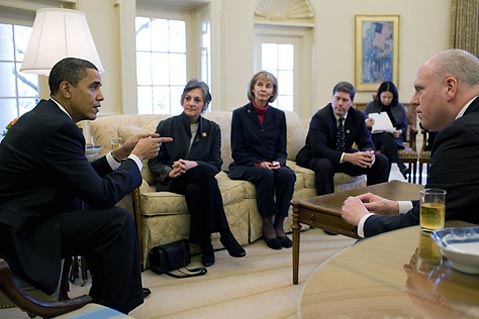Not Perfect but ‘Very Good’
Capps Votes in Favor of Health Insurance Reform Bill

Before Lois Capps could cast her ballot in favor of the House’s health care reform package Sunday night, she had to walk past a crowd of about 500 protestors, angrily chanting “Kill the bill.” Unlike one of her congressional colleagues, a minister from St. Louis whom Capps had invited to the Central Coast several years ago, Capps was not spit upon. Nor was she called “nigger” or “faggot” as were Representatives John Lewis and Barney Frank for their support of the controversial measure. While Capps had her own misgivings about the bill — the absence of a public option, for example, and restrictive language she says will make it harder for women to obtain abortion coverage — Capps’s vote was never in doubt.
Before emerging as an unassuming political power broker among Santa Barbara Coast Democrats, Capps — as she is quick to remind her constituents — worked as a public school nurse. From that vantage point, she dealt daily with students who lacked access to affordable health care; for Capps, the need was obvious and urgent. In her official statement presented to the Congressional Record, Capps invoked the language of the civil rights movement, terming the moment “a long time coming.”
Capps said the House bill would extend health insurance to 32 million people who now go without. Of those, she said, 92,000 lived in her district. “Passing this legislation is a matter of life and death for them, as an estimated 45,000 Americans die every year because they lack health insurance,” she said. Capps also said the new law would strengthen the position of people who already have insurance — roughly 80 percent of the population — but who may get denied coverage in times of need because of preexisting conditions, some as minor as acne. Capps said the bill would prevent insurance companies from dropping customers outright after they become ill — a practice known as rescission.
In addition, the House bill would outlaw lifetime spending caps from health insurance policies and allow parents to claim children up to the age of 26 on family policies. Capps cited a report released last week by the Congressional Budget Office, concluding that the new bill would actually reduce the federal budget deficit by $138 billion in the next 10 years and by $1.2 trillion in the following 10 years. That same study also stated that insurance premiums should drop by up to 20 percent per policyholder. Without the bill, Capps said, premiums would increase by 80 percent in the next 10 years. These figures are based on the bill’s mandate that everybody must have insurance, a requirement that a number of attorneys general from states opposing the bill have vowed to challenge on constitutional grounds. For families earning less than $88,000 who cannot afford a employer-provided health insurance policy, the new bill provides for federal subsidies for bare-bones policies that will be made available at “state insurance exchanges.” These exchanges, mandated by the bill, do not exist yet.
Capps lamented the loss of the “public option,” a government-run health insurance provider, which she said could have kept premiums down by virtue of competitive pressure. The public option — decried as socialism and too expensive — was dropped from the bill in hopes of securing support from more conservative Democrats and some Republicans. Ultimately not one Republican voted for the bill, which passed with just three votes to spare. Thirty-four Democrats also voted no.
Early on, Capps had sought — unsuccessfully — to defuse the issue of abortion. This past summer, Capps introduced a measure she said would maintain the status quo of the Hyde Amendment, which bars the use of federal funds to pay for abortions. (Capps, a staunch supporter of abortion rights, opposes the Hyde Amendment.) While Capps managed to win over some anti-abortion colleagues, Bart Stupak, a Michigan Democrat, pushed for more stringent restrictions. His language — which was strongly backed by the U.S. Conference of Bishops — prevailed over Capps’s in the House, but was deleted by the Senate. When Stupak and his supporters sought to reinsert those restrictions this past weekend, it appeared the bill might go down to defeat. Stupak’s position weakened after an organization representing American nuns, and another representing Catholic-owned hospitals, broke with the bishops and endorsed less-restrictive language. Stupak relented and voted in favor of the health insurance bill. When Republicans sought to reintroduce his restrictions, Stupak himself argued against them. Accounts vary, but that’s when Texas Republican Randy Neugebauer shouted either “Baby killer” or “It’s a baby killer.”
In her Congressional Record statement, Capps conceded the bill was far from perfect, but concluded, “I’m not one to let the perfect be the enemy of the good; and in this case, we have legislation that is very good.”



